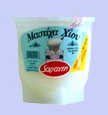 Here is a flavour to chew on. Masticha is a white resin that comes from the mastic tree in the Mediterranean. It grows extensively on the Greek island of Hios which is fabled as Homer’s birthplace. In fact, Homer would likely have chewed mastic in the same amber resinous form that we can buy it today. As food products go, mastic is about as unprocessed as you can find. A small packet of pebble-sized pieces sells for a dollar. If you take a bit and let it soften in the mouth, the coniferous flavour quickly disappears. What remains is a very small, very durable and pliable bit of chewing gum that will last for a long time without disintegrating. It is not unlike the spruce and pine gum traditionally chawed in Quebec. Here is a flavour to chew on. Masticha is a white resin that comes from the mastic tree in the Mediterranean. It grows extensively on the Greek island of Hios which is fabled as Homer’s birthplace. In fact, Homer would likely have chewed mastic in the same amber resinous form that we can buy it today. As food products go, mastic is about as unprocessed as you can find. A small packet of pebble-sized pieces sells for a dollar. If you take a bit and let it soften in the mouth, the coniferous flavour quickly disappears. What remains is a very small, very durable and pliable bit of chewing gum that will last for a long time without disintegrating. It is not unlike the spruce and pine gum traditionally chawed in Quebec.
The plant has many uses. Mastic resin is found in varnishes. The berries can be crushed to obtain an oil which is used in a liquor or they can be used whole to flavour sausages. The plant’s leaves and stems are burned to smoke meats. Masticha is often prepared in a liquid form, mixed with honey or sugar, and spooned into cold water as the main flavour for a refreshing drink.
Masticha is an important ingredient in Greek festival breads. At New Year’s, a traditional bread called Vasilopeta or St. Basil's Bread is prepared. Traditionally, Vasilopeta is not cut until new Year’s Eve but a twisted loaf, called Tsoreki, is made from pretty much the same ingredients and is available now. In Greece, depending upon your village creed, Tsoreki might be eaten only at Easter; however, it is common to see it in Greek bakeries around Montreal at this time of year too.
Tsoreki is a not-too-rich but fairly dense yeast bread. It is made with milk, eggs, sugar and a little masticha, however the flavour is barely sweet with only a hint of mastic’s resinous tone. This is a bread to eat with strong tea or coffee and maybe a little thick Greek yogurt on the side. Like Jewish chollah, which it resembles, slightly stale Tsoreki makes superb French toast. 
|

